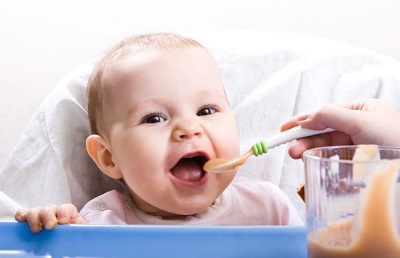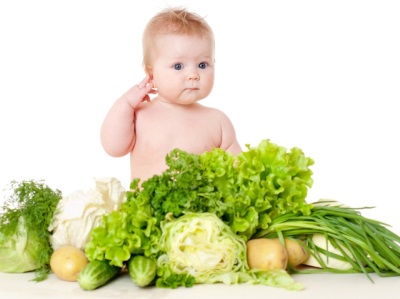Menu of the child at 7 months: the basis of the diet and nutritional principles
A kid at the age of seven months had recently eaten only mother's milk or a mixture, but some time ago vegetables, cereals and fruits appeared in his menu. The child rejoices at the new tastes, and the task of the parents should be the correct beginning of acquaintance of the baby with the new food. Let's take a look at what new products a seven-month-old baby tries and how to build his diet at this age.
What foods can be added to the diet?
At the age of seven months Breast milk remains the staple of the infant-fed diet. The baby gets it in the morning after waking up and in the evening before bedtime. In other feeds, the crumb is trying with might and main to try other foods that can also be washed down with milk from her mother's breast.
At 7 months, the baby continues to get acquainted with vegetables and cereals. Those babies who started feeding on vegetables at the age of six months begin to try a non-dairy gruel, and those babies who have chosen porridge for the beginning of their lures, become familiar with vegetable puree. The portion of these products increases.
Vegetable oil is becoming a new product in the diet of a breast-fed infant at the age of seven months. It is most often added to vegetables in the amount of about 1/5 of a teaspoon (about 1 gram).
An artificial child, as well as a baby, whose mother, due to a lack of milk, started feeding from 4-5 months, at the age of seven months can already try a toast, biscuit, egg yolk and fruit juice. Porridge for such babies can already be cooked with milk. In addition, cottage cheese appears in their diet. All new products start to give from a small portion and gradually increase their number to the recommended one at a given age.
If parents began to lure with fermented milk products, guided recommendations Komarovsky, then by seven months their baby already eats 150 ml of kefir and 40 g of cottage cheese. At this age, according to Komarovsky, porridge is introduced (a famous pediatrician advises porridge made from rice, buckwheat, or oatmeal) cooked in milk. This dish is a popular doctor offers to give the last feeding before bedtime.
How much should a baby eat?
The total daily amount of food for a seven-month baby is determined based on its weight. To find out how much approximately a child of this age should eat per day, you need to divide his body weight by 8 or 9.
Recommendations for feeding foods:
Pproduct | Maximum consumption in 7 months | |
Breast-feeding | Artificial feeding | |
Vegetable puree | 120 g | 150 g |
Dairy free porridge | 180 g | 200 g |
Fruit puree | 60 g | 60 g |
Vegetable oil | 1 g | 3 g |
- | 5 g | |
Fruit juice | - | 30 ml |
Cottage cheese | - | 30 g |
Yolk | - | 1/4 |
Cracker, Cookies | - | 5 g |
Diet
At the age of seven months, the baby eats five times a day, with breaks between meals from 3.5 to 4 hours.

Sample menu
For a baby who was fed only breast milk before the age of 6 months, at 7 months the menu would look like this:
Meal | Products and dishes |
The first | Mother's milk |
Second | Porridge to 180 g |
Third | Vegetable puree up to 120 g and vegetable oil up to 1 g |
Fourth | Puree of fruit up to 60 g and mother's milk |
Fifth | Mother's milk |
In a seven-month-old baby, who began to be lured at 4-5 months of age due to a lack of breast milk from mom, the menu will be as follows:
Meal | Products and dishes |
The first | Mother's milk |
Second | Porridge to 200 g on mix or on cow's milk, butter to 5 g |
Third | Vegetable puree up to 150 g, vegetable oil up to 3 g, a quarter of chicken yolk, fruit juice up to 30 ml |
Fourth | Fruit puree up to 60 g, cottage cheese up to 30 g, baby cookies or crackers, mother's milk |
Fifth | Mother's milk |
The formula-fed baby will look like this at the age of 7 months:
Meal | Products and dishes |
The first | Adapted mix |
Second | Porridge to 200 g on mix or on cow's milk, butter to 5 g |
Third | Vegetable puree up to 150 g, vegetable oil up to 3 g, a quarter of chicken yolk, fruit juice up to 30 ml |
Fourth | Fruit puree up to 60 g, cottage cheese up to 30 g, baby cookies or crackers, adapted mixture |
Fifth | Adapted mix |
The baby, who began to lure with the recommendations of Komarovsky, the diet in 7 months will be as follows:
Meal | Products and dishes |
The first | Breast milk or adapted mix |
Second | Kefir to 150 ml and cottage cheese to 40 g |
Third | Breast milk or adapted mix |
Fourth | Breast milk or adapted mix |
Fifth | Porridge on cow's milk up to 180 g |
Tips
Do not treat the recommendations for the introduction and complementary foods and tables with the timing and amount of food with excessive zeal. They should serve only as a guide, and parents should take into account first of all the individual characteristics and the state of health of the child.
Consider the following nuances:
- Before you give a crumbs new product, you need to pay attention to various factors, such as the child's well-being and the absence of diseases (including allergies), weight gain, good appetite and others.
- A seven-month baby is already sitting well, so you should feed him in a sitting position. For greater convenience, it is worth buying a special children's chair for the crumbs.
- Prepare fresh meals daily for your child. Before giving food to the baby, check the temperature of the product and mix well.
- Who does not want to try to force a new baby feeding is impossible. There are many reasons for this behavior, for example, the taste didn’t like or the child wasn’t hungry enough. Breastfeed your baby, but continue to offer him new food.
- Feed the baby with a spoon and do not be afraid to give the baby a spoon in his hands, so that he begins to try to eat on his own. Of course, so much of the food gets past the mouth and plates, but the child needs to start learning to master this skill.
- Choosing the first porridge, consider the characteristics of cereals. For example, rice has a lot of starch, but this cereal is the safest for allergy sufferers, and buckwheat has a lot of vitamins. Boiled gruel can be diluted with mom's milk or a mixture.
- To give a new group of foods complementary foods should be only after fully getting used to the already introduced products. To make it easier to track which dish has a negative reaction, let the baby have one-component food first.
- Use a sieve, mixer or blender to cook a 7-month-old baby. So you can achieve the desired homogeneity of the product.











